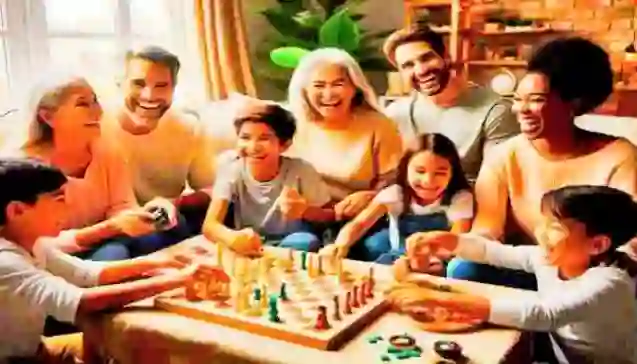Have you ever quietly wondered how many of your relationships are just “transactions” and how many are truly heartfelt? Today, everything is measured by return on investment (ROI), and we have started measuring our relationships that way, too.
It’s common to think, “I did so much for them; what did I get?” or “What’s in it for me in this friendship?” But when relationships become only about give and take, their true essence is lost.
Relationship: A Journey Beyond Self‑Interest is not just a poetic idea; it is the key to a meaningful and fulfilling life. In this article, we’ll go beyond calculations to explore the pure and honest side of relationships, where intimacy and trust matter most.
The Trap of Modern Relationship:
Today’s life moves very quickly. Career competition, the virtual world of social media, and the unrealistic importance we give to ourselves are all changing how we relate to others. Our relationship are shifting because of these pressures.
- Social media’s impact: Friendships are often evaluated based on the number of likes and followers one has. Instead of truly taking part in each other’s lives, we have become mere beholders.
- Lack of time: In our busy lives, we do not have time for one another. Meetings and conversations now happen only when it’s convenient or necessary.
- Hyper-individualism: We focus so much on our happiness, space, and needs that we ignore other people’s feelings and needs.
As a result, relationship have become like a balance sheet, where giving (debit) and taking (credit) are constantly being tracked.
Warning Signs of Transactional Relationship:
When a relationship is based on self-interest, it can be emotionally draining. Here are some clear signs to look for:
- Conditions Apply:
- In such relationships, love and support come with conditions.There’s always an unspoken rule like, “I’ll be with you only if you listen to me,” or “This friendship will last only as long as I benefit from it.”
- Emotional Unavailability
- People in these relationships may join you in your happy moments, but they disappear during your difficult times. When you need emotional support, they often don’t have the time or the willingness to be there for you.
- Lack of Communication and Rising Misunderstandings
- In these relationships, open conversation is absent. Each word must be spoken with caution due to fear—“What will they think?” or “Will they misuse what I say?” It leads to misunderstandings and creates emotional distance.
A selfish kinship is like a beautiful fruit that’s rotten inside. It looks fine on the outside, but it gives you no energy or nourishment.
Journey Beyond Self‑Interest
To move relationship out of the “give and take” frame and into real closeness, you need to make a conscious effort. This journey is not difficult; you need to change the way you look at your kinships.
1. The Art of ‘Being’ Beyond Give and Take:
In a genuine relationship, simply being with each other matters more than the actions you take for one another. Without saying or doing anything, your mere presence can offer support. When you’re sick and someone quietly sits beside you, that presence can feel more healing than any medicine.
2. Vulnerability as True Strength:
Being honest about your mistakes, fears, and feelings shows trust. We often try to look “strong,” but simply saying “I’m not okay today” or “I need your help” brings people closer. Showing vulnerability isn’t a weakness—it’s a powerful way to make relationship more genuine.
3. Listening Beyond Words:
Communication is not just talking. Empathy means imagining yourself in the other person’s situation and truly understanding their feeling. Saying “I understand how you feel” must come from the heart, not be just words. When you begin to hear what isn’t being said, the true intimate journey of a keenship starts.
Building blocks of Healthy relationship:
Like a strong building relies on a solid foundation, pure connections depend on core values. These values are more than words; they are actions that give a relationship the power to withstand any storm and flourish.
1. Unconditional Trust:
Trust is the breath of any relationship. Without it, the kinship suffocates. Unconditional trust is more than honesty; it’s an invisible thread of emotional safety.
It is the feeling that “no matter what happens, this person will stand by me, understand me, and never betray me.”
This trust doesn’t form overnight; it grows slowly through small, honest actions, kept promises, and loyalty during tough times.
2. Mutual Respect:
Respect goes beyond using polite titles or refraining from speaking rudely. Respect is more than that. It means accepting another person’s thoughts, feelings, dreams, boundaries, and independence as they are. Saying “you must think like me” or “I’m always right” isn’t respect—it’s control.
Think of respect like two trees in a garden. They share the same soil but grow in their way, at their own pace, and in their shapes. They don’t take each other’s space but offer each other shade.
In a relationship, both people need personal space to grow. Respecting each other’s opinions, likes, dislikes, and choices means letting each other grow freely.
3. Unconditional Support:
Many cheer for you in good times, but few reach out to lift you when you fall. Unconditional support means believing in your partner’s dreams and encouraging them to chase those dreams.
You do not have to agree with every decision they make, but it is vital to show you stand by them.
Think of support like a lighthouse in a storm: it can not stop the storm, but it guides ships safely to shore.
While you may not be able to solve your loved ones’ problems, your emotional and mental support can provide them with the strength to overcome those challenges. Don’t worry; I am here for you. It can give you the courage to face any crisis.
4. Growing Together:
There is a difference between a stable bond and a stagnant one. A bond that never changes or grows becomes tired and lifeless over time. Growing together means more than just getting older side by side.
It means evolving as individuals and as a pair. It involves helping each other improve, supporting each other’s personal growth, and adapting together through life’s changing stages.
Expert Views and Scientific Backing:
These ideas aren’t just idealistic—psychology and science support them.
- A Harvard University study spanning over 80 years found that a long, happy life doesn’t come from money, fame, or career success, but from close, loving relationships. Individuals with strong family and social ties tend to maintain better health, both physically and mentally.
- Research in the Journal of Health and Social Behaviour shows that people who feel emotional security and support in their relationships have much lower levels of stress, depression, and anxiety.
- When we spend time with loved ones, touch them, or do selfless acts, our brain releases oxytocin. Known as the “love hormone” or “bonding hormone,” it makes us feel safe and happy.
It shows that Relationships: A Journey Beyond Self‑Interest is not just about emotions—it’s vital for our overall well‑being.
Frequently asked questions:
1.Is prioritising your own needs in a relationship selfish?
No, it is not. Taking care of yourself and maintaining healthy boundaries are essential for a strong relationship. As long as you respect the other person’s feelings, prioritising your mental health is not selfish.
2. How can I spot a selfish friend or partner?
If someone only contacts you when they need something, is jealous of your successes, ignores your feelings, and always talks about themselves, that relationship is likely selfish.
3. What’s the difference between a toxic and a selfish relationship?
A selfish relationship is one-sided—one person always takes. A toxic relationship is more harmful; it actively damages your self‑esteem, peace of mind, and happiness. Every toxic relationship is selfish, but not every selfish relationship is toxic.
4. Is it possible to love without any expectations?
No one can have zero expectations—that’s human nature. But you can avoid unrealistic or one‑sided demands. There’s a big difference between doing something out of love and doing it because you expect something in return. The joy of love comes from giving, not getting.
5.What if you always feel like you’re the one giving in the relationship?
It is a sign of emotional burnout. Talk honestly with the other person. Clearly express how you feel. If nothing changes, consider resetting the boundaries of the relationship.
conclusion:
Relationships aren’t like math equations where you tally every give and take. Instead, they resemble a beautiful garden where you plant seeds of trust, communication, respect, and care. Nurturing this garden requires the water and time it needs to flourish.
However, if selfishness or transactional thinking creeps in, the garden can quickly wither. Only when you stop measuring every benefit do you truly experience a heartfelt connection.
Such bonds bring joy and enrich our lives, making us feel more complete as individuals.
Take a moment to reflect: In your garden of relationships, are you planting seeds of accounting, or are you cultivating seeds of caring?
Feel free to share your thoughts or experiences in the comments, and pass this on to those you want to journey with.

